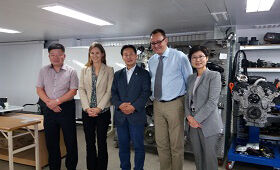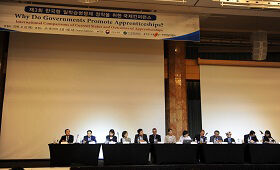BIBB at 3rd International Conference on Apprenticeship Training in Korea
The third International Conference on Apprenticeship Training – entitled “Why do governments promote apprenticeship?” – was staged at BIBB’s Korean partner institute, the Korean Institute for Vocational Education and Training (KRIVET), on 22 September 2016.


Over the past few years, the Korean government has reacted to global calls for an expansion of dual structures in vocational education and training, such as those formulated by the ministers of labour of the G20, by establishing a Korean form of dual VET. The purpose of the conference was to outline initial academic research findings as to the functionality of the system and to debate the current status with vocational education and training experts from various countries.
Dr. Philipp Grollmann presented the latest data relating to VET in Germany and spoke about the major challenges being faced.
A further focus was on evidence with regard to costs and benefits of dual vocational education and training in Germany and Switzerland. In Swiss VET, the cost structures are clearly more favourable for companies than is the case in Germany. Dr. Anika Jansen, an expert on the cost and benefits of dual vocational education and training at the Federal Institute for Vocational Education and Training used joint work carried out by BIBB and its Swiss colleagues as a basis for offering the conference a number of explanations for this state of affairs. Relative to the earnings of skilled workers, the training salaries received by Swiss apprentices are, for example, lower than those paid in Germany. Trainees in Switzerland are also more likely to be deployed productively.
Attention was attracted by the observation that companies are increasingly withdrawing from dual training, even in Germany. This is a challenge which the dual system needs to tackle. The two researchers involved from BIBB are currently conducting a research project to investigate the issue of company willingness to provide training in Germany, in a number of other European states (Portugal, France, Spain, Italy, Slovakia and England) and in Korea. This is expected to produce answers to the question of which factors contribute towards motivating companies to participate in the highly varied forms of “work-based” learning which exist in formalised training in the different countries. The BIBB researchers also used their time in Korea to join their Korean colleagues in visits to motor vehicle service companies. The aim here is to use case studies to learn more about the motivational structure which encourages Korean firms to commit to training.